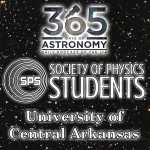Podcaster: Dr. David Zaslavsky
 Title: In Search of Saturation: The Structure of Hadrons at High Energy
Title: In Search of Saturation: The Structure of Hadrons at High Energy
Organization: The Society of Physics Students (SPS) at The University of Central Arkansas
Link : The Society of Physics Students (SPS) at The University of Central Arkansas
Description: For half a century, physicists have been probing the structure of protons using particle accelerators with increasingly higher energies. As the collision energy has grown by orders of magnitude, the protons involved behave like increasingly dense collections of quarks and gluons, or partons, which we describe mathematically using parton distribution functions (PDFs). A PDF roughly represents the probability for a particular type of parton to interact with another particle during the collision.
It’s been clear for some time that, as collision energy increases, the PDFs grow in a way that is not sustainable. Extrapolating their behavior from the experimental results we have so far leads to nonsensical conclusions like probabilities greater than 1. Clearly, at some point a new physical phenomenon, which we call saturation, has to kick in to slow the PDFs’ growth. The latest generation of colliders – the LHC at CERN and RHIC at Brookhaven – are just on the verge of exposing the first experimental evidence of saturation.
In my talk, after giving a quick primer on proton structure, I’ll describe the theoretical motivation for saturation, show how we search for its experimental signature, and present the results of my research on one of the most accurate tests of saturation physics to date. The result I’ll be talking about is a set of predictions for the scattering cross section in proton-nucleus collisions. Comparing these predictions to measurements allows us to test how closely different models for the parton distribution match reality.
Bio: The Society of Physics Students (SPS) at The University of Central Arkansas is incorporates outreach, demonstrations, tutoring and guest speakers into our SPS Chapter.
Dr. David Zaslavsky from Penn State Department of Physics
Today’s sponsor: This episode of “365 Days of Astronomy” is sponsored by — no one. We still need sponsors for many days in 2016, so please consider sponsoring a day or two. Just click on the “Donate” button on the lower left side of this webpage, or contact us at signup@365daysofastronomy.org
End of podcast:
365 Days of Astronomy
=====================
The 365 Days of Astronomy Podcast is produced by Astrosphere New Media. Audio post-production by Richard Drumm. Bandwidth donated by libsyn.com and wizzard media. You may reproduce and distribute this audio for non-commercial purposes. Please consider supporting the podcast with a few dollars (or Euros!). Visit us on the web at 365DaysOfAstronomy.org or email us at info@365DaysOfAstronomy.org. This year we will celebrate more discoveries and stories from the universe. Join us and share your story. Until tomorrow! Goodbye!

